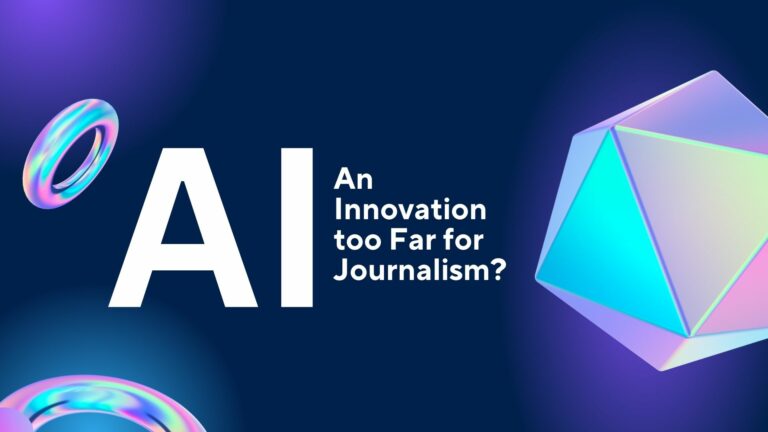AI: An Innovation too Far for Journalism?

Years ago, when I was Bloomberg’s head of breaking news for Central and Eastern Europe, the Powers That Be (alright, the IT department; that’s where the power lies these days, right?) introduced a handy new function that automated headlines and top paragraphs for economic statistics and corporate earnings. With a quick keystroke, the editor entered a number into the Automation template screen and, whatdyaknow, a single paragraph, grammatically correct and with the percentage increase etc., was whisked through the Net to readers within microseconds, instead of minutes, as was previously the case.
Neat huh?
Then why did I feel at the time like a shadow had crossed over the gravestone of Journalism? Today’s AI is Automation on steroids, and the foreboding I felt back then with the development of Automation, which took the writer out of the writing, has only grown stronger.
Let me be clear: there is no stopping Artificial Intelligence or its increasing presence in our everyday lives. How could it, when it genuinely helps us all write, calculate, plan and communicate better – and as I mentioned earlier – faster, much faster.
But for the dinosaurs in our midst (guilty as charged), it all seems so much like the Terminator’s SkyNet. I have a good friend in Prague who recently hosted an international art show here in the Czech capital. She worried openly, and for the first time in her life, how much of the exhibition’s graphic arts submissions were generated by AI. It was a fair question, and a nagging worry.
Which brings me to News. As a lifelong journalist, it is natural to wonder what the implications are for the craft that I practiced for decades.
Technological developments have long driven the way news is delivered to the world: from town criers to the printing press, to radio and television, to the Internet and now beyond. And for a person whose first reporting job included a desk with an actual typewriter, I have welcomed with open arms the innovations that have landed at journalism’s doorstep and made the job of news-gathering more efficient and painless. Think Google.
But is AI an innovation too far for the news industry?
David Casswell, in a column for the Reuters Institute, wrote:
The public release of ChatGPT in late November of 2022 demonstrated capabilities with such obvious and profound potential impact for journalism that AI-driven innovation is now the urgent focus of the senior leadership teams in almost every newsroom. The entire news industry is asking itself ‘what’s next’?
What’s next indeed. The implications of establishing clear boundaries around the use of AI in the newsroom and policing reporters with access to the technology are staggering, and a bit disconcerting. As a reader, a consumer of news, perhaps all you want are the facts, forget who – or what – is presenting them. Fair enough. But are we ready to cede human intellect, curiosity and logic to machine learning, just to make our lives easier?
Now that I am teaching journalism at UNYP, I find myself face to face with a generation that doesn’t have the same trepidations as I or my long-time colleagues in the industry do. And I ask myself: how do I instill a bit of healthy fear of what the future holds in an AI World and convince them not to take the easy road and let AI not only into our lives but into our very souls? I ask that question without a trace of hyperbole.
Budding reporters must ask themselves why they want to pursue the craft, and it is a craft. To inform? Even to entertain? To bask in the indescribable joy of finding the right words to express themselves? Writing words, expressing oneself, is singularly human. Writing from the head and the heart, with a dedication to making the world a better place, should be a prime motivator for tomorrow’s journalists as they step into an ever-more complicated future. That’s something SkyNet will never be able to do. Or so I hope.
UNYP Chronicle Newsletter
The e-mail address you provide will be used only to send you the newsletter. Your privacy is important to us.

Contacts
University of New York in Prague
Londýnská 41, 120 00 Praha
ID no: 25676598
Phone:
+420 224 221 261
Email: unyp@unyp.cz







